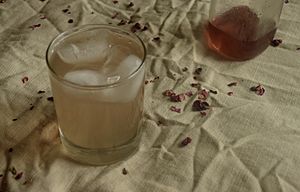Posca facts for kids
Posca was a popular drink in ancient Rome. It was made by mixing vinegar and water. Posca was refreshing but not as tasty or filling as wine. It was usually a drink for soldiers, people from the lower classes, and slaves.
Contents
What Was Posca?
Posca was a simple and common drink in ancient Rome. It was mainly a mix of water and wine vinegar. Sometimes, other things were added to make it taste better. This drink was important for many Romans, especially those who worked hard or were in the army.
Why Did Romans Drink It?
Romans drank posca for several reasons. It was cheap and easy to make. It also helped keep people hydrated, especially in hot weather or during long marches. For soldiers, it was a practical drink that could be carried easily. Even important leaders, like the emperor Hadrian, would drink posca to show they were just like the common soldiers. This showed their support and shared the soldiers' simple life.
How Was Posca Made?
The basic recipe for posca was very simple: just water and wine vinegar. The vinegar gave it a sharp, tangy taste.
Posca's Ingredients
While the main ingredients were water and vinegar, people sometimes added other things to posca. These additions could include herbs like cumin, fennel seeds, or thyme. Salt was also sometimes added. These extra ingredients helped to improve the flavor and sometimes even had health benefits.
Posca Through History
Many old Roman writings mention posca, showing how widely it was used. From famous writers like Pliny the Elder to funny plays by Plautus, posca appears often.
Posca in the Roman Army
Posca was a very important drink for the Roman army. Soldiers often drank it during their campaigns. It was seen as a drink that helped keep them strong and ready for battle. Some historians even believed that the Roman army's success was partly due to simple but good foods and drinks like posca. For example, a rule from the year 360 AD said that lower-ranking soldiers should drink posca and wine on different days. This shows how important posca was in their daily lives.
The Name "Posca"
The word posca comes from Latin, possibly from a word meaning "to drink." In ancient Greece, they didn't have a specific word for posca. So, when Greek writers talked about it, they used their word for "vinegar." Later, the word posca traveled into the Greek language as the Byzantine army (which continued Roman traditions) kept drinking it. They called it phouska.
See also
 In Spanish: Posca para niños
In Spanish: Posca para niños
 | Janet Taylor Pickett |
 | Synthia Saint James |
 | Howardena Pindell |
 | Faith Ringgold |


